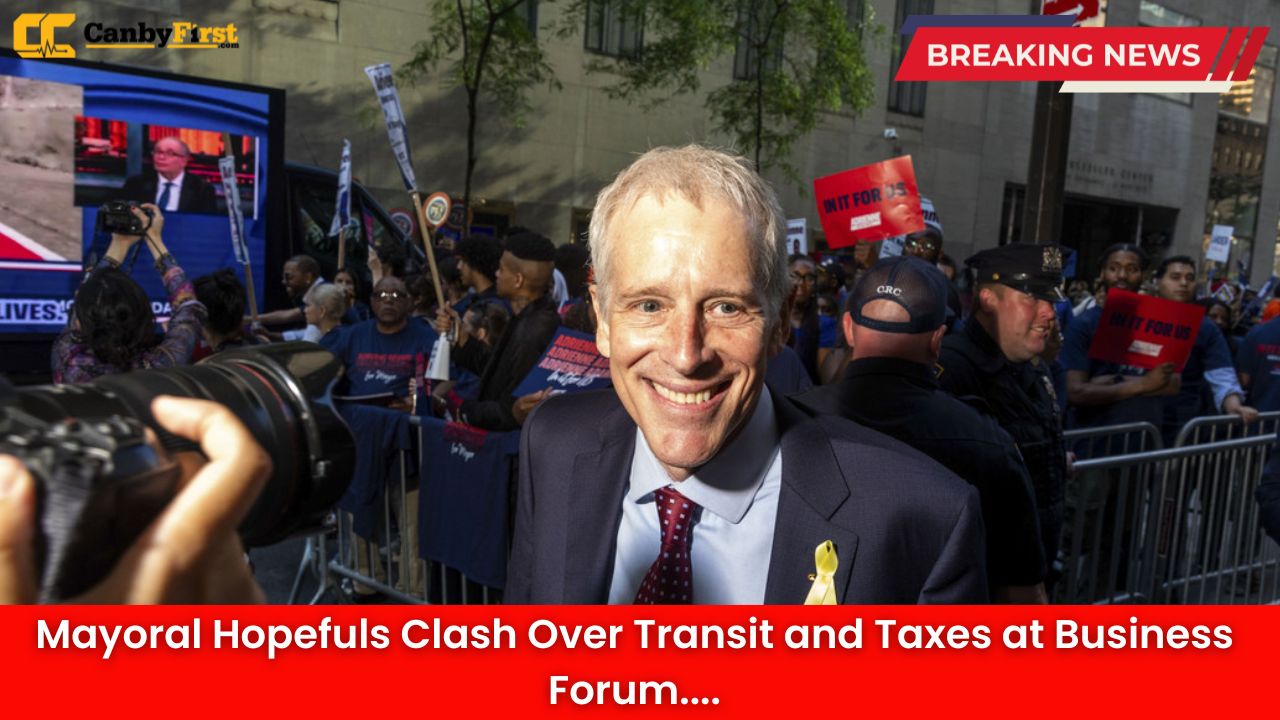New York, US: New York’s crowded 2025 mayoral race took a sharp turn this week as candidates traded barbs during a high-stakes business forum in Midtown, putting transportation policy, taxes, and city spending under intense scrutiny. Among them, State Assemblymember Zohran Mamdani grabbed headlines with his bold pitch for a fare-free bus system — a policy that quickly drew both applause and skepticism from rivals on stage.
Heated Exchanges Over Transit Vision
The forum, hosted by the New York City Chamber of Commerce, brought together a diverse slate of mayoral hopefuls, from business-friendly Democrats to progressive reformers. Mamdani, representing Astoria in the State Assembly and known for his democratic socialist platform, seized the moment by arguing that public transit should be “a right, not a revenue stream.”
According to Mamdani, making city buses free would “restore equity and efficiency” for millions of working-class New Yorkers, especially those in outer boroughs where subway access remains limited. He framed the initiative as both an economic and environmental necessity, claiming it would reduce congestion and boost small business foot traffic.
Also Read
“This city spends billions subsidizing corporations while working people can’t even afford a ride to work,” Mamdani said to loud cheers from progressive attendees. “Free buses aren’t radical — they’re just fair.”
Rivals Hit Back
Other candidates swiftly countered Mamdani’s proposal, warning that his plan lacked a clear funding mechanism and could worsen the city’s fiscal outlook.
Former City Comptroller Scott Stringer questioned how Mamdani’s plan would fit into a budget already straining under post-pandemic recovery costs and rising pension obligations. “We all want better transit, but you can’t run the city on slogans,” Stringer quipped, drawing murmurs of agreement from parts of the crowd.
Brooklyn Borough President Vanessa Gibson labeled the idea “idealistic but irresponsible,” arguing that farebox revenue — which contributes roughly $1 billion annually to the Metropolitan Transportation Authority’s budget — is too significant to dismiss without a solid alternative. “We can’t risk service cuts or layoffs,” she said.
Meanwhile, tech entrepreneur Raymond Chu took a different tack, suggesting that reforms to the MTA’s bureaucracy could achieve better service outcomes than sweeping fare elimination. “Let’s fix procurement inefficiency before we promise something we can’t pay for,” Chu said.
Business Leaders Divided
The audience, composed largely of small business owners, finance executives, and nonprofit representatives, appeared split on the issue. While some praised Mamdani’s focus on equity, others voiced concern about potential tax hikes to fund free transit.
“I appreciate the progressive vision,” said Midtown restaurateur Carla Martinez, “but business margins are already razor-thin. Any increase in commercial taxes could push us over the edge.”
Yet others saw promise in Mamdani’s argument that easier commutes could boost economic participation. “If more workers from Queens and the Bronx can move freely across boroughs, everyone benefits,” noted logistics firm director Gabriel Li.
Broader Themes of Fairness and Funding
Beyond transportation, the debate exposed deeper ideological divisions in the race. Candidates differed sharply on how to fund city programs and stimulate job growth. Progressive contenders called for higher taxes on luxury real estate and corporate profits, while centrists emphasized fiscal prudence, private-sector partnership, and attracting new businesses to the city.
Mamdani, unflinching in his critique of corporate subsidies, called for “redirecting wasteful spending” from tax breaks for developers toward community infrastructure. “If Amazon gets helipads, working-class New Yorkers deserve free buses,” he declared.
Stringer, in contrast, insisted the city must focus on managing its existing resources more efficiently. “New York doesn’t have a revenue problem, it has a management problem,” he countered.
The Political Stakes
With less than a year until the Democratic primary, the forum underscored how transportation — often overlooked in mayoral politics — has become a defining issue. Polls show that while public safety remains voters’ top concern, rising fares and unreliable service have climbed steadily in importance as economic pressures mount.
Several analysts believe Mamdani’s free bus proposal, while polarizing, could help distinguish him in a crowded field dominated by familiar faces. “He’s forcing the conversation leftward,” said one campaign observer after the forum. “Even if his plan doesn’t pass a cost-benefit test, it changes what’s considered politically possible.”
City Financing in Focus
Budget experts estimate a citywide fare-free bus system would cost between $700 million and $900 million annually — roughly 2% of New York City’s current budget. Mamdani argued that new revenue could come from taxing vacant luxury properties, closing corporate loopholes, and cutting unnecessary NYPD overtime spending.
Critics, however, warned that such measures are politically fraught and insufficient to sustain long-term funding. MTA officials, while not directly responding to the proposal, have noted that fare revenue remains a crucial pillar of the authority’s operational stability.
A Preview of Campaign Themes
As the debate wrapped up, the exchanges hinted at how each candidate plans to position themselves going forward. Mamdani aims to energize younger and working-class voters hungry for systemic reforms, while moderates like Stringer and Gibson will likely court business confidence and fiscal restraint.
Chu and other outsiders, meanwhile, are pitching technology-driven governance as an alternative to ideological politics. “We can’t code our way to social justice,” Mamdani fired back during a heated moment — earning both applause and eye rolls from different corners of the room.
What Comes Next
With upcoming televised debates and borough town halls on the horizon, the free bus proposal appears poised to remain a flashpoint throughout the campaign. Policy experts say the conversation signals a broader reevaluation of how New York defines public good and economic growth.
For Mamdani, that’s exactly the point. “If the next mayor can’t imagine a city where transportation is free and fair,” he said, “then we’re not imagining a city for everyone.”
As New Yorkers left the forum, one thing was clear: the race for City Hall is not just about who can manage the city — it’s about who dares to redefine it.












